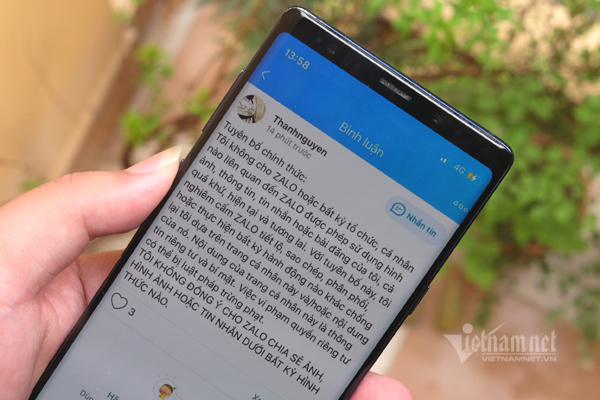 |
In the past few days, many Zalo users have spread the same message on their personal accounts: "I do not allow Zalo or any organizations or individuals related to Zalo to use my images, information, messages or posts, both in the past, at the present and the future."
They wrote: “With this statement, I prohibit Zalo from disclosing, copying, distributing or taking any other actions against me based on this personal page and/or its content. The content of this profile is private and confidential. Violation of privacy can be punished by the law."
In fact, this is not the first time the trend to "claim to protect personal data" has appeared in Vietnam. In late 2019, a similar trend emerged on Facebook, attracting many users.
Like Facebook, Zalo users have to agree to share their information with the Zalo developer from the moment they accept the social network's terms of use.
Accordingly, in section 7 in Zalo's terms of use, when using the service of this provider, the user acknowledges that Zalo has the right to use the system APIs to access data on the phone.
These APIs include access to phone contacts, getting the current location with consent, writing application data to a memory card, and accessing the Internet from the device. Along with access right, Zalo will collect information such as personal information, general information, location information, and contacts. However, the developer also commits not to use any means to track the content of the message, exchange or track users.
Today's Internet platforms force users to agree to rules that are beneficial to these companies if they want to use their products.
From the time they download the app to create an account, users are required to agree to rules and terms. Therefore, it can be said that the claims made by Zalo users do not have much legal value.
However, through these rights-demanding movements, it can be seen that Vietnamese users are increasingly paying more attention to the protection of personal data. This shows a change in perception on the part of the Vietnamese people.
This is a positive movement of the online community because even though the the Internet is virtual, all activities on it are real and have the ability to directly affect anyone in the real world.
Trong Dat

Vietnam suggests US$3,475 penalty for personal data breach
The move by Vietnam's Ministry of Public Security is essential as it is the personal information protection that shows respect for the right of each person.